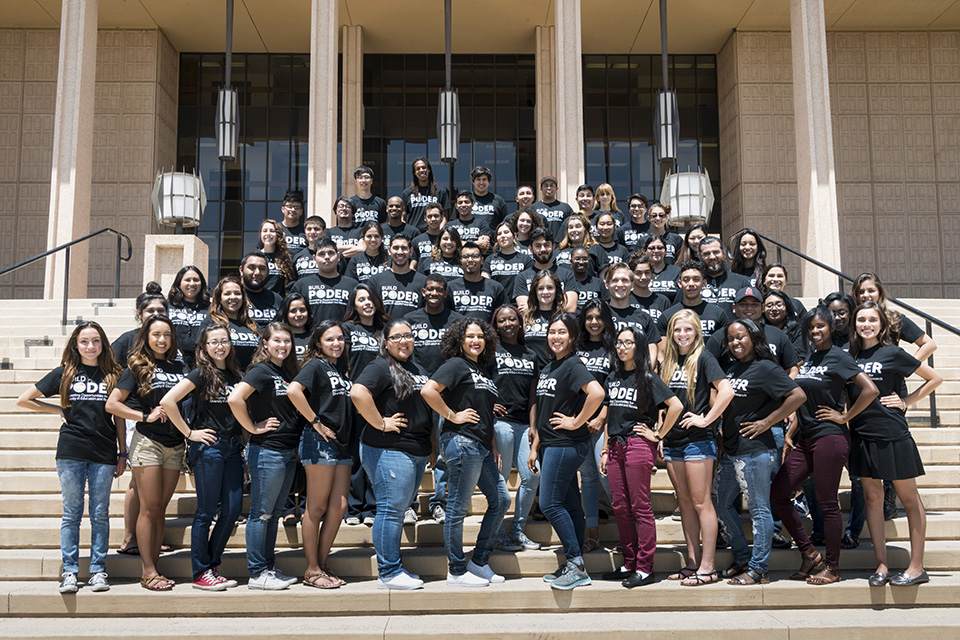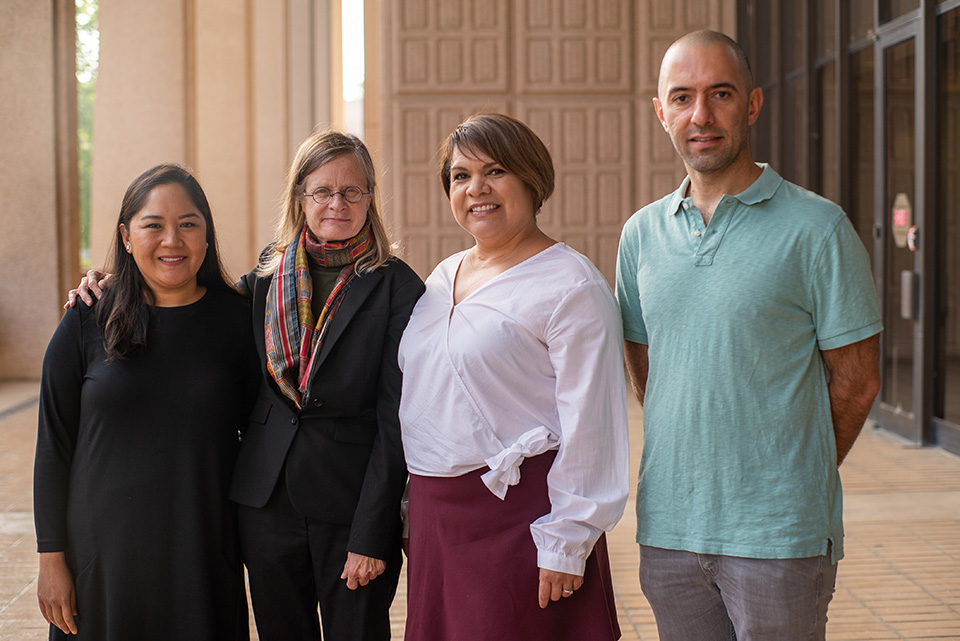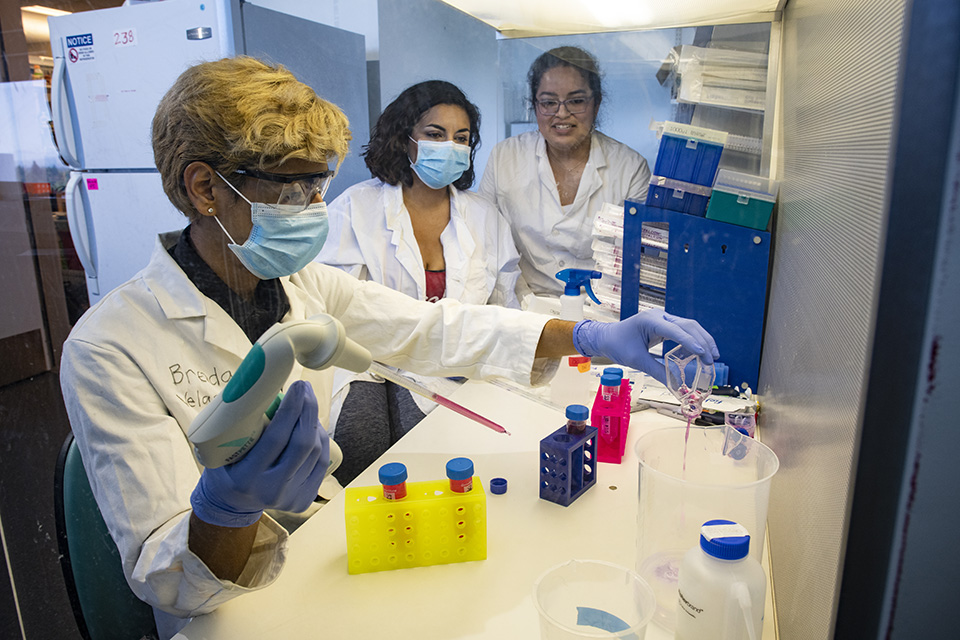CSUN Program Continues Creating Paths to Biomedical Careers with $19M Grant
Research Diversity Program BUILD PODER Launches its Next Five Years with New Grant, Looks Back at its First Student Success Stories
Calvin Apodaca ’17 (Biology) dreamed of becoming a director and majored in film when he first walked CSUN’s halls in 2010. But just one year later, a life-altering experience inspired him to pursue a new career path in biomedicine.
At 18, Apodaca was diagnosed with concurrent testicular cancer and acute lymphoblastic lymphoma, two very rare types of cancer. He endured three years of chemotherapy that delayed, but did not derail, his CSUN education. Spending most of his time in hospitals, he got to know the health care system well, and he didn’t like what he saw.
Apodaca discovered that medical errors were more common than he imagined and often found errors in his records.
“I had to learn to be vigilant about looking at data points like blood work, medication dosages and identifying information because whenever that information was wrong, it usually spiraled out into worse medical errors that kept me in the hospital longer,” Apodaca said.
In 2015, he returned to CSUN as a biology major with hopes of solving this type of issue in health care systems. Opportunity knocked that year when he learned of a brand-new program called BUILD PODER, and he applied to be in the first cohort.
Apodaca is just one of more than 240 students who have participated in BUILD PODER at CSUN. Since the program’s launch in 2014, cohorts have been funded for doctoral programs, master’s programs and post-baccalaureate programs, and more than half of BUILD students are currently in graduate programs. More than 60 percent have been accepted into master’s and doctoral programs.
BUILD PODER (Building Infrastructure Leading to Diversity, Promoting Opportunities for Diversity in Education and Research) aims to increase the number of traditionally underrepresented students in the biomedical fields by training undergraduates in biomedical research and providing financial support. BUILD PODER’s focus is critical race theory, with an emphasis on solving health disparities in the biomedical workforce.
This summer, the National Institutes of Health (NIH) announced it had awarded CSUN $19 million over the next five years in ongoing support of BUILD PODER. This is one of the largest grants in CSUN history, following the original $22 million five-year grant from the NIH in 2014. The grant is the latest in a 10-year effort to establish a national model at CSUN that can be replicated at educational institutions of higher learning across the country.
Carrie Saetermoe, CSUN psychology professor and one of the principal investigators for BUILD PODER, explained the importance of diversity in research.
“BUILD tries to re-center science in a way that includes these diverse voices,” she said. “That will bring new research questions and methods. And that’s ultimately what we’re trying to do.”
Mission accomplished, for phase one. The goal for the first five years of the program was to increase the number of students doing research in the biomedical sciences. In just four years, organizers were able to increase the number of students from non-traditional communities and the amount of research they did.
“[BUILD PODER] gives students a sense of confidence and competence,” said Gabriela Chavira, another principal investigator and co-director of student training. “That’s the biggest impact that it’s having for students from underrepresented communities. Before, they didn’t see themselves in the sciences, or really didn’t feel that they had a place. And now they know that [because of the program], they have a stronger sense of belonging, and they have a science identity.”
Paulo Sitagata ’18 (Kinesiology) is another BUILD PODER success story for CSUN. When he was studying at L.A. Valley College in 2015, he saw a poster for the program in a physiology class. He was pleasantly surprised at the amount of academic and financial support he received by making that leap. BUILD PODER partners with three local community colleges and several doctoral-granting institutions (Drexel University, USC, UCLA, UCSD and the University of North Texas, Health Sciences Center).
“[BUILD PODER] gave me so many resources. They paid for conferences so we could learn about different environments and educated me on doing research,” Sitagata said. “Through BUILD PODER, I have seen what can be done if you’re given those resources. I can say with confidence, I wouldn’t have made it to Northwestern University if it weren’t for BUILD.”
Sitagata also credited the program’s built-in summer research program, which opened the door for a summer research position in the physical therapy department at Northwestern University in Evanston, Ill. That summer opportunity launched him toward continuing his education, also at Northwestern, where he’s working on his doctorate of physical therapy with plans to graduate in 2021. This year, Sitagata also co-authored a publication in the journal Topics in Stroke Rehabilitation, for the research he did as an undergraduate alongside his CSUN mentor, professor of kinesiology Taeyou Jung.
In addition to the academic perks of the CSUN program, students establish a sense of community. Apodaca said the best part about being in BUILD PODER was building long-lasting relationships within his cohort. He credits his success to his fellow students and faculty who helped him along the way.
“None of this was self-made,” he said. “All of it was from the help of others. None of this would have been possible without the help of other people. I owe it to them.”
Apodaca is using his skills acquired through BUILD PODER in his current job as research coordinator at the University of Washington Information School, while pursuing his Ph.D. in biomedical and health informatics. He is paving the way toward a more technologically advanced health care system, currently creating virtual reality kits for children with cancer. The kits allow patients to communicate with friends and play video games as therapeutic play to provide support for those going through chemotherapy or dialysis. Inspired by his own survivor story, Apodaca feels he’s fulfilling his purpose now that he is able to give others the support they need.
“I knew there was a place for me,” Apodaca said, “and because of BUILD PODER, I was able to find it.”




 experience
experience